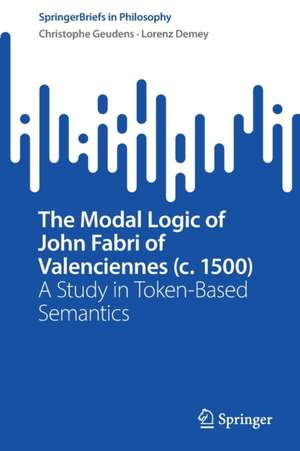The Modal Logic of John Fabri of Valenciennes (c. 1500): A Study in Token-Based Semantics: SpringerBriefs in Philosophy
Autor Christophe Geudens, Lorenz Demeyen Limba Engleză Paperback – 4 mai 2022
Din seria SpringerBriefs in Philosophy
-
 Preț: 345.63 lei
Preț: 345.63 lei - 17%
 Preț: 359.61 lei
Preț: 359.61 lei -
 Preț: 345.91 lei
Preț: 345.91 lei -
 Preț: 378.54 lei
Preț: 378.54 lei -
 Preț: 348.79 lei
Preț: 348.79 lei -
 Preț: 376.59 lei
Preț: 376.59 lei -
 Preț: 377.73 lei
Preț: 377.73 lei -
 Preț: 411.54 lei
Preț: 411.54 lei - 15%
 Preț: 463.68 lei
Preț: 463.68 lei -
 Preț: 378.12 lei
Preț: 378.12 lei -
 Preț: 376.80 lei
Preț: 376.80 lei -
 Preț: 440.86 lei
Preț: 440.86 lei -
 Preț: 375.45 lei
Preț: 375.45 lei -
 Preț: 341.86 lei
Preț: 341.86 lei -
 Preț: 444.13 lei
Preț: 444.13 lei -
 Preț: 376.80 lei
Preț: 376.80 lei -
 Preț: 377.73 lei
Preț: 377.73 lei -
 Preț: 408.05 lei
Preț: 408.05 lei -
 Preț: 375.07 lei
Preț: 375.07 lei -
 Preț: 377.35 lei
Preț: 377.35 lei -
 Preț: 481.79 lei
Preț: 481.79 lei -
 Preț: 413.66 lei
Preț: 413.66 lei - 15%
 Preț: 463.85 lei
Preț: 463.85 lei -
 Preț: 380.84 lei
Preț: 380.84 lei -
 Preț: 376.59 lei
Preț: 376.59 lei -
 Preț: 376.22 lei
Preț: 376.22 lei -
 Preț: 376.80 lei
Preț: 376.80 lei -
 Preț: 349.10 lei
Preț: 349.10 lei -
 Preț: 348.79 lei
Preț: 348.79 lei -
 Preț: 377.18 lei
Preț: 377.18 lei -
 Preț: 132.39 lei
Preț: 132.39 lei -
 Preț: 380.25 lei
Preț: 380.25 lei -
 Preț: 380.25 lei
Preț: 380.25 lei - 15%
 Preț: 460.91 lei
Preț: 460.91 lei -
 Preț: 378.12 lei
Preț: 378.12 lei -
 Preț: 378.34 lei
Preț: 378.34 lei -
 Preț: 379.68 lei
Preț: 379.68 lei -
 Preț: 343.00 lei
Preț: 343.00 lei -
 Preț: 377.73 lei
Preț: 377.73 lei - 20%
 Preț: 321.52 lei
Preț: 321.52 lei -
 Preț: 343.33 lei
Preț: 343.33 lei - 15%
 Preț: 465.34 lei
Preț: 465.34 lei -
 Preț: 379.68 lei
Preț: 379.68 lei -
 Preț: 377.57 lei
Preț: 377.57 lei -
 Preț: 376.80 lei
Preț: 376.80 lei -
 Preț: 475.83 lei
Preț: 475.83 lei -
 Preț: 407.52 lei
Preț: 407.52 lei - 15%
 Preț: 461.73 lei
Preț: 461.73 lei -
 Preț: 345.63 lei
Preț: 345.63 lei -
 Preț: 379.86 lei
Preț: 379.86 lei
Preț: 411.16 lei
Nou
Puncte Express: 617
Preț estimativ în valută:
78.68€ • 85.81$ • 66.34£
78.68€ • 85.81$ • 66.34£
Carte tipărită la comandă
Livrare economică 24 aprilie-08 mai
Preluare comenzi: 021 569.72.76
Specificații
ISBN-13: 9783030988012
ISBN-10: 3030988015
Pagini: 113
Ilustrații: VI, 113 p. 1 illus.
Dimensiuni: 155 x 235 mm
Greutate: 0.18 kg
Ediția:1st ed. 2022
Editura: Springer International Publishing
Colecția Springer
Seria SpringerBriefs in Philosophy
Locul publicării:Cham, Switzerland
ISBN-10: 3030988015
Pagini: 113
Ilustrații: VI, 113 p. 1 illus.
Dimensiuni: 155 x 235 mm
Greutate: 0.18 kg
Ediția:1st ed. 2022
Editura: Springer International Publishing
Colecția Springer
Seria SpringerBriefs in Philosophy
Locul publicării:Cham, Switzerland
Cuprins
Chapter 1. Introduction.- Chapter 2. The Foundations of Fabri’s Modal Logic.- Chapter 3. Fabri’s Logic of Composite Modals.- Chapter 4. Model-theoretic Reconstruction of Fabri’s Logic of Composite Modals.- Chapter 5. Fabri’s Logic of Composite Modals in its Historical Context.- Chapter 6. Fabri’s Logic of Divided Modals.- Chapter 7. Fabri’s Logic of Divided Modals in its Historical Context.- Chapter 8. Conclusion.- Appendix I: Transcription of Fabri’s Questions on De int. 12-13.- Appendix II: Formal Proofs.- Index.
Notă biografică
Christophe Geudens is a Junior Research Fellow at the FWO/Research Foundation Flanders and KU Leuven, specializing in the history of modal logic and logical geometry. He holds a Masters in linguistics and a PhD in the history of logic (both from KU Leuven), and he is an Honorary Fellow of the Belgian American Educational Foundation (BAEF). He has published in venues such as Argumentation, History and Philosophy of Logic, Vivarium, and Historiographia Linguistica.
Lorenz Demey is a Research Professor at KU Leuven, specializing in logical geometry and the history of modal logic. He studied philosophy, mathematics, logic and artificial intelligence in Leuven and Amsterdam. In 2020 he received the Frans Van Cauwelaert Prize from the Royal Flemish Academy of Belgium (KVAB). He has published in venues such as Journal of Philosophical Logic, Synthese, and History and Philosophy of Logic.
Lorenz Demey is a Research Professor at KU Leuven, specializing in logical geometry and the history of modal logic. He studied philosophy, mathematics, logic and artificial intelligence in Leuven and Amsterdam. In 2020 he received the Frans Van Cauwelaert Prize from the Royal Flemish Academy of Belgium (KVAB). He has published in venues such as Journal of Philosophical Logic, Synthese, and History and Philosophy of Logic.
Textul de pe ultima copertă
Caracteristici
The first monograph to cover issues in modal logic at the eve of the Renaissance An important contribution towards a history of philosophy without any gaps The first study to interpret post-medieval debates on modal logic against the backdrop of the Wegestreit
